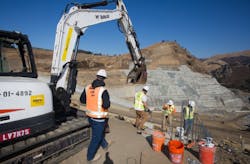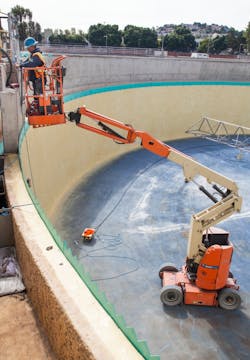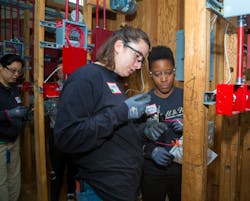Working toward a younger, more diverse and representative workforce
The concept of the Silver Tsunami — a generation of workers retiring from their jobs and taking their institutional knowledge with them — is a familiar challenge for many public-sector agencies. But the scale and scope of the issue facing the water and wastewater industries outpaces those in other similar fields.
According to various studies, as many as 3 million workers will need to be replaced over the next decade due to retirements in the water and wastewater industries. That amounts to roughly one-third of the total national workforce.
With those daunting figures in mind, the Water Agency Leaders Alliance (WALA) — a coalition of executives representing public water utilities across the nation, including the San Francisco Public Utilities Commission (SFPUC) — is working to meet utility workforce needs by training frontline communities that need access to good jobs.
The issues confronting the industry are numerous and multi-faceted. Not only is the workforce aging rapidly, it also lacks racial, gender and age diversity. According to a report published by the Brookings Institute, a staggering 85 percent of the employment sector is comprised of older white males. These statistics support WALA’s objective to prepare a new workforce that is younger, more female and more representative of the diverse communities served by these utilities.
WALA’s first major initiative was spearheading federal legislation to create a national grant program for workforce development in the water and wastewater utility sector — the first of its kind for the water industry. The WALA perspective was clear: the aging workforce is a daunting challenge but also a once-in-a-lifetime opportunity to prepare frontline communities for good career opportunities and intentionally diversify the sector. It would be easy to view the aging workforce as a crisis, but WALA had several reasons to be optimistic.
Utility jobs offer a career path toward a solid middle-class future, with fewer educational barriers than other fields. Unlike some public-sector jobs, a college degree is not a necessity for a rewarding, lifelong position in the water and wastewater industry. In fact, more than half of industry workers — 53 percent — have a high school diploma or less, according to the same Brookings Institute study.
However, those workers require more extensive on-the-job training and familiarity with a variety of tools and technologies, which is why federal partnership through a national workforce development grant program is so critical. The program was designed to benefit communities — both large and small, rural and urban — across the country, each of which has a water and/or wastewater utility with hiring needs.
In order to build political support, WALA coordinated with an array of partners, including the National Association of Clean Water Agencies (NACWA), the National League of Cities (NLC), the National Skills Coalition, and the U.S. Water Alliance, and secured bipartisan backing from Senators Cory Booker (D-New Jersey) and Shelley Moore Capito (R-West Virginia) who co-authored a bill to create the program.
Thanks to champions like Senators Booker and Capito — and other Congressional leaders from both red and blue states — the program was created in the passing of the 2018 Water Resources Development Act, the biannual law addressing water programs throughout the country.
In December 2019, after years of development and advocacy, the program received full funding at $1 million for the first year of the program through the federal appropriations process.
The competitive grant program will be administered by the Environmental Protection Agency and will be awarded to entities that propose compelling workforce development programs. Guidance is forthcoming, but the program is authorized to fund a variety of uses, including training programs for mission-critical skilled trades and regional collaborations to support water workforce development activities. Eligible grant recipients include nonprofits, labor unions, community colleges, and other training and educational institutions partnering to address the workforce needs of water and wastewater utilities.
Already, the industry has countless examples of innovative initiatives that could prove worthy of national funding support.
In Atlanta, the Preparing Adult Offenders to Transition through Training and Therapy program (PAT³) provides vocational training, workforce development and employment opportunities for ex-offenders. Upon completion of the vocational training phase, participants will become certified employees in the Department of Watershed Management.
While the initial $1 million investment for the program may seem small for a national initiative, it is an important first step to demonstrate federal support and partnership for local water workforce development programs. Given the large national need, WALA is already working to reauthorize and expand the program for two more years at $10 million per year.
At its heart, the national grant program is about establishing a more inclusive, representative and forward-thinking future for the water and wastewater industries. The water sector offers good-paying jobs with a pathway toward a stable, rewarding career for local residents and their families. But many of these prospective employees are simply unaware of the opportunities available to them.
It is imperative that we increase awareness about these fulfilling careers and provide the training, support and resources necessary to ensure we have an engaged workforce reflective of the communities where we operate. What better way to serve our customers, than to employ residents who live in our neighborhoods?
The Silver Tsunami is a scary prospect to confront. But we are at a unique juncture to shape the future of the water sector, and we cannot waste this opportunity. This national grant program can help us take advantage of this moment. WW
About the Author
Juliet Ellis
Juliet Ellis is the chief strategy officer/assistant general manager for external affairs at the San Francisco Public Utilities Commission. Over years of involvement with community outreach, she has managed multi-million dollar projects to benefit underserved communities and businesses throughout the Bay Area. As executive director of the Urban Habitat program, she successfully transitioned this San Francisco-based non-profit organization into a $2 million national leader. Ellis has been a Commissioner of SFPUC and served on numerous other national, regional and local boards and committees. She’s currently a member of the President’s White House Advisory Council on Faith-based and Neighborhood Partnerships, Environment and Climate Change Taskforce. She received her Master of Science in Business Administration at San Francisco State University with an emphasis in environmental and urban studies.



